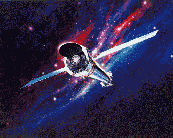|
|
Chandra X-ray Observatory
Full resolution image

NASA’s Advanced X-ray Astrophysics Facility (AXAF), renamed the Chandra X-ray Observatory in honor of Subrahmanyan
Chandrasekhar, was launched and deployed by the Space Shuttle Columbia
on July 23, 1999. The combination of high resolution,
large collecting area, and sensitivity to higher energy X-rays will
make it possible for Chandra to study extremely faint sources, sometimes
strongly absorbed, in crowded fields. Chandra was boosted into an
elliptical high-earth orbit that allows long-duration uninterrupted
exposures of celestial objects.
Mission Characteristics
 Lifetime :
23 July 1999 - (nominal 5 year mission) Lifetime :
23 July 1999 - (nominal 5 year mission)
 Energy Range : 0.1-10 keV
Energy Range : 0.1-10 keV
 Special Features
: 64 Hours highly-eccentric Earth orbit. Special Features
: 64 Hours highly-eccentric Earth orbit.
Spatial resolution < 1 arcsec
 Payload :
Payload :
A single Wolter Type 1 grazing incidence iridium-coated imaging
telescope with a ghost free FOV ~ 30´ diameter and an
effective area of 800 and 400 cm2 @ 0.25 and 5 keV
respectively.
Four detectors could be inserted, one at a time, into the
focal plane. Two of these were designed to be used primarily with
the gratings.
- AXAF Charged Coupled Imaging Spectrometer
(ACIS; 0.2-10 keV)
2 CCD arrays for a total of 10 chips. 8 chips are Front
Illuminated (FI) and 2 are Back Illuminated (BI).
FI: Eff area 340 cm2 @ 1 keV, E/dE = 20-50 @ 1 and 6 keV
BI: Eff area 340 cm2 @ 1 keV, E/dE = 9-35 @ 1 and 6 keV
- ACIS-I. One 4-chip imaging array, all FI.
FOV 16´ X 16´
- ACIS-S. One 6-chip spectroscopic array, 4 FI and 2 BI
FOV 8´ X 48´. To be used primarily with the grating.
- High Resolution Camera (HRC; 0.1-10 keV)
2 micro-channel plate
detectors.
- HRC-I One 90mm square detector optimized for imaging. FOV
~30´ X 30´, eff. area 225 cm2 @ 1 keV,
~ 0.5 arcsec spatial resolution
- HRC-S One 20 X 300 mm rectangular detector optimized for use with
the LETG transmission gratings experiment. FOV 7´ X 97´
- High Energy Transmission Grating + ACIS-S (HETG; 0.5-10 keV)
spectral resolving power (E/dE) 60-1000.
- Low Energy Transmission Grating + HRC-S (LETG; 0.08-6 keV)
spectral resolving power (E/dE) 30-2000.
 Archive : HEASARC hosts a copy of the Chandra archive and few Catalogs
Archive : HEASARC hosts a copy of the Chandra archive and few Catalogs
[Chandra Science Center]
[Chandra User Support]
[All Missions]
[by Time]
[by Energy]
Page authors: Lorella Angelini Jesse Allen
HEASARC Home |
Observatories |
Archive |
Calibration |
Software |
Tools |
Students/Teachers/Public
Last modified: Thursday, 24-Sep-2020 18:24:31 EDT
|


